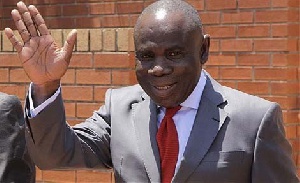Mandela’s task was to set his people free from the bondage of apartheid ideology and let the nation on the path to prosperity and freedom. I am acutely mindful of those who accuse Mr. Mandela of accommodating the interests of former oppressors. Let me leave posterity to judge this one, as my defence will be jaundiced.
Q: Did Mandela, in his radical years, ever meet Kwame Nkrumah? We know he trained in Ethiopia, and Emperor Haile Selassi gave him a gun as a present.
A: Mr. Mandela visited Ghana around 1960 or thereabout for over 10 days. But unfortunately, for good reason. Mr. Mandela saw Kwame Nkrumah as a hero who associated himself to the liberation struggle of South Africans of every race. He did travel to Ghana to meet him. The intermediary was Kofi Batsa, the then co-editor of the CPP-owned newspaper, The Spark. Mr. Batsa, whom my wife and I met on two occasions in the US, on authority provided the known reason why Mr. Mandela did not meet Nkrumah on his first visit to Ghana.
At the time, Nkrumah was recovering from a major assassination attempt on his life and therefore access to him was restricted. In fact, Erica Powell, who was Nkrumah’s private secretary at the time of the assassination [attempt], in her memoir, described her boss as becoming a recluse after the attempt on his life. Mandela, though, met all the relevant cabinet and party officials and the ANC was accorded fulsome support.
This bit of history is important here, as there are some who attributed Mandela’s failure to meet Nkrumah as a snub. They claim the reason was that the ANC was open to all race and was losing its Pan-Africa identity, and that Nkrumah was leaning toward the Pan African Congress.
The idea that Nkrumah refused to meet Mandela because the ANC opened to all South African race, is far from the truth, and in fact it is not even a historical fact in the least.
Nkrumah, while Pan-Africanist to boot, was equally non-radical. Three women who were key to Nkrumah’s professional life till his death in 1972 were all white - namely Erica Powell, June Milne and Juliet Wright. In fact, June Milne had both South African and Australian ancestors and is still Nkrumah’s literary executrix. She is the person who was closest to Nkrumah during his long and painful years in exile. And of course, Erica Powell was both the first private secretary and confidante of Nkrumah.
In the main, it was under the bludgeonings of circumstances that deprived the two giants of pan-Africanism not to meet. And as fate would have it, Nkrumah received Oliver Tambo, the then-president of the African National Congress, warmly when he visited Ghana in 1962. Here, too, Kofi Batsa described the encounter as a meeting of soul mates who saw the ANC and the CPP as vanguards of the total liberation of the African continent.
At the risk of being accused of dropping names by my South African compatriots who are protective of these heroes and heroines, it is relevant that I share with you a brief conversation I had with Mrs. Adelaide Tambo 12 years ago at Mr. Mandela’s birthday celebration. She told me one of her late husband’s fondest memories during the exile years was the period he spent in Ghana and the meeting he had with Nkrumah.
“Oliver, after meeting Nkrumah for the first time, Mrs. Tambo said, “came to the hotel and said liberation in our lifetime was possible as long as Nkrumah and his ideas live.”
Juxtapose this account by Mrs. Tambo to an event in July 1992 when the remains of Nkrumah were transferred and reburied at the National Memorial Park in Accra. Among the invited dignitaries was Mr. Oliver Tambo, who at that time was recovering from a massive stroke. Against the advise of his medical team, Tambo traveled from Sweden to Ghana to honour the occasion and paid a moving tribute.
Why have I gone to this length to narrate these historical anecdotes? It is to for cold water on the multiple falsehoods that Mandela and the ANC weren’t pan-African enough and that Nkrumah did not welcome the tactics and strategies of the ANC. At the end of the day it was not the ANC or the PAC that mattered, it was about the liberation and property of our beloved continent.
Q: What are Mandela’s views on Nkrumah’s over-throw in 1992?
A: I don’t think we have specifically discussed this issue, but Mandela’s overall view on coup d’etats in Africa is negative. Remember, he was in prison in 1986 when Nkrumah was overthrown, and I guess his first thoughts were, as with all pan-Africanists, “There goes the African dream,” His ideas had sunk into every freedom fighter on the continent.
Let me say that every African should avail themselves of copies of he many books Nkrumah wrote; search online. They are as relevant today as 50 years ago. Is is instructive to read the early speeches of Mandela when he was first released from prison in 1990. both Nkrumah and Mandela were original African thinkers and pragmatists in the same vein. That is what has made them great.
General News of Tuesday, 10 December 2013
Source: The Daily Dispatch













